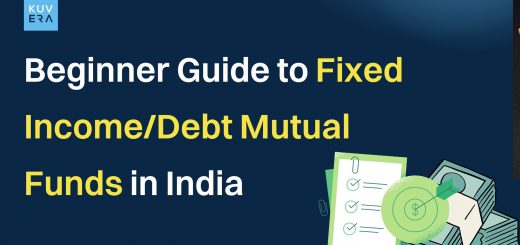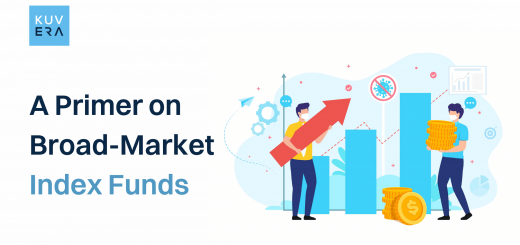Equity savings funds are hybrid funds that invest in equities, debt instruments, and equity arbitrage positions. The equity component aims to deliver decent returns while the debt portion helps mitigate the volatility risks. These hybrid funds are ideal for investors with a moderate risk profile looking for capital appreciation.
Top 10 Equity Savings Funds in India for 2022
The following list of the ten best equity savings funds based on their 5-year returns.
*Data as of May 30 2022,
Find the direct plans of the best-performing equity savings funds on Kuvera. Create your financial goals and get your investment plan with our calculator. Download the Kuvera app to discover Direct Plans and Fixed Deposits, and start investing today.
The following sections will cover everything about hybrid funds. Read on to learn more.
How Do Equity Savings Funds Work?
Equity savings schemes are open-ended hybrid funds that invest in equity, equity-related instruments, debt, and arbitrage opportunities. These are a relatively new type of hybrid funds introduced in 2017. According to SEBI’s circular, equity savings funds must invest at least 65% of their assets in equity and a minimum of 10% in fixed-income instruments.
These hybrid funds have exposure to both equity and debt. The equity allocation helps to generate sufficient capital over a long-term investment horizon. Meanwhile, its fixed-income portion usually comprises high-quality debt instruments, which generate stable returns while minimizing interest rate risks.
Equity savings schemes also invest in arbitrage opportunities, where the fund capitalizes on price differences in the market. The fund manager of these funds can alter their asset allocation according to prevailing market conditions. This allows them to contain any losses while sustaining your purchasing power.
A portion of the equity allocation (around 40-70% of total assets) is used to profit from risk-free arbitrage trades. The un-hedged or active equity allocation ranges from 20% to 30% and is the main contributor to capital appreciation. The fixed-income allocation ranges from 10% to 35% of the total portfolio.
Around 70-80% of the total assets of these funds generate regular income with relatively low volatility. According to SEBI’s regulations, equity savings mutual funds must state the minimum and maximum hedged/un-hedged positions and defensive allocations in the Scheme Information Document (SID).
In short, equity savings funds aim to reduce risks and volatility while delivering regular income. The low equity exposure means long-term growth potential but with limited risks. However, returns are much lower than other equity-oriented funds.
Who Should Invest in Equity Savings Funds?
The following investors may want to invest in these equity savings funds:
- Conservative investors wanting equity exposure: These funds suit conservative investors who fear losses from market volatility but want exposure to equities. These offer more returns than pure debt funds and fewer risks than pure equity funds.
- Investors looking for better alternatives to FDs: These are ideal for investors who want to move away from traditional investments like fixed and recurring deposits. However, it is essential to remember that these funds carry market-linked risks.
- Those with a medium-term investment horizon: Equity savings schemes are ideal if you have a short-medium investment horizon. So, if you want to get sufficient returns for a short-term goal, you can choose these funds.
- New or inexperienced investors: These funds can suit you if you are new to equity investments and averse to high risks. You can try to invest in equities through these funds without being subject to high volatility.
Advantages of Investing in Equity Savings Funds
The following is a list of benefits of investing in equity savings funds:
-
Portfolio diversification
These hybrid funds have a diversified portfolio. While the equities allocation delivers moderate returns, the debt and arbitrage securities help minimise portfolio risk. So, instead of choosing many funds and tracking their performance, you can select equity savings funds to diversify your investments.
-
Downside protection
Since the investments in equity savings schemes are spread across different asset classes, it mitigates the overall risk factor. Moreover, a part of the equity allocation is hedged and used to generate risk-free returns from arbitrage. These funds are appropriate for risk-averse investors who want to invest in equities.
-
Profits from arbitrage
Arbitrage involves buying securities from one market and selling them at another to profit from their price differences. As equity savings funds allocate assets to take advantage of arbitrage opportunities, they can generate considerable returns in volatile markets.
-
Tax efficiency
These are more tax-efficient than debt funds as they let you benefit from the lower taxes applicable on equity funds. Long-term capital gains (LTCG) tax is applicable at a 10% rate if you hold these investments for over a year. However, if your total gains are below Rs. 1 lakh, you do not have to pay any tax.
Risks Associated with Investing in Equity Savings Funds
Although the risks of investing in ESS are higher than debt funds, these offer higher growth and potential returns. However, their risks are much lower than pure equity and aggressive hybrid funds as these funds invest in debt securities and engage in risk-free arbitrage.
Their diversification into different asset classes helps to reduce the risks of ESS further. Overall, the risk level associated with these funds is lower than most hybrid mutual funds, even though it is higher than most debt funds.
That said, it is important to understand that returns from equity savings funds are not always predictable. If there are no arbitrage opportunities in the market, the scheme will need to invest in debt instruments, reducing the potential returns. Investors should also keep in mind that returns from the un-hedged equities portion entirely depend on the market.
That is why it is important to perform due diligence before investing in these mutual funds.
Things to Consider before Investing in Equity Savings Funds
Here are some of the most important factors to check before investing in equity savings schemes:
- Risks-returns analysis: Before you invest in any mutual fund, you will want to check if you are comfortable with its risk levels. While risk-averse investors usually go for debt funds, those who are willing to take higher risks for higher returns can choose equity funds. Equity savings funds are ideal for those with moderate risk tolerance.
- Past performance: Studying the past performance will tell you how well the fund manager has operated it. You should check its returns across different market cycles. You will also want to compare the returns with the benchmark index and competitors.
- Financial goals: The top equity savings funds are those that will likely fulfill your financial goals. Before investing, make sure that the fund’s past performance and objectives are in line with the expected returns and financial goals.
- Investment horizon: As an ESS invests in stocks, you will want a minimum investment horizon of 12 months. These funds are ideal for a medium-term investment horizon, around 2-3 years for growing your investments. They also work well for a term of 5 years and more.
- Role of the fund manager: The fund managers of these funds have the flexibility to change asset allocations to suit market conditions. They also decide and execute the strategy to gain income from arbitrage. That is why you will want to check the fund manager’s reputation, their experience, and track record before investing.
- Expense ratio: This is the commission charged by the AMC (Asset Management Company) for proper management of your mutual fund investments. You will want to choose a fund charging a lower expense ratio as a higher charge will lower your potential returns.
Final Word
Equity savings funds are hybrid funds that invest in equities, debt, and arbitrage opportunities. They are ideal for risk-averse investors looking for higher income than debt funds or fixed deposits. These are relatively safe alternatives to pure equity and aggressive funds and are meant for those who do not like the volatility of equities.
Frequently Asked Questions
-
What are hybrid mutual funds?
Hybrid mutual funds invest in more than one asset class, usually equities and debt. Depending on the scheme’s investment objective, they can also invest in other asset classes like gold or real estate. Hybrid funds aim to provide better returns than debt funds while being less risky than equity funds.
-
Why is arbitrage considered a low-risk trading activity?
Arbitrage trading is relatively risk-free because it involves buying and short-selling mispriced securities in the spot and futures market. As you trade the exact quantities of the same security, their prices converge before the futures expiry date, and you can book risk-free profit.
-
Are equity savings funds appropriate for retirees?
Although equities are risky, retirees may want to allocate a small portion of their portfolio towards them. This is because returns from fixed-income sources are usually not enough due to inflation throughout their retirement years. Equity savings funds are ideal for risk-averse investors who need extra income.
Interested in how we think about the markets?
Read more: Zen And The Art Of Investing
Watch/hear on YouTube:
Start investing through a platform that brings goal planning and investing to your fingertips. Visit Kuvera.in to discover Direct Plans and Fixed Deposits and start investing today.
#MutualFundSahiHai #KuveraSabseSahiHai!











